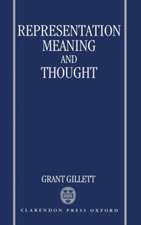Science, Understanding, and Justice: The Philosophical Essays of Martin Eger
Autor Martin Eger Editat de Abner Shimonyen Limba Engleză Paperback – 30 sep 2006
Preț: 279.08 lei
Nou
Puncte Express: 419
Preț estimativ în valută:
53.41€ • 57.99$ • 44.86£
53.41€ • 57.99$ • 44.86£
Carte disponibilă
Livrare economică 02-16 aprilie
Preluare comenzi: 021 569.72.76
Specificații
ISBN-13: 9780812694611
ISBN-10: 0812694619
Pagini: 538
Dimensiuni: 154 x 229 x 30 mm
Greutate: 0.75 kg
Editura: Open Court Publishing Company
Locul publicării:United States
ISBN-10: 0812694619
Pagini: 538
Dimensiuni: 154 x 229 x 30 mm
Greutate: 0.75 kg
Editura: Open Court Publishing Company
Locul publicării:United States
Descriere
Martin Eger’s work is the most insightful exploration of the social context of the natural sciences since C.P. Snow’s The Two Cultures, and a vital contribution to contemporary debates over scientific literacy.
This collection of essays deals with controversial and topical issues in philosophy of science, education, and morality. Also included are exchanges between Eger and leading philosophers, including a dialogue with Abner Shimony, who edits this volume and contributes an account of Eger’s life, work, and importance.
A professional physicist, Eger found that hermeneutic philosophy, associated with Heidegger, Gadamer, and Habermas, had developed techniques for unpacking meanings and for analyzing human claims to knowledge that strikingly parallels the theses of post-empiricist philosophers of physics such as Thomas Kuhn. Eger’s application of hermeneutic methods enabled hermeneutics to be extended from social investigations to investigations of nature, and softened the attack of post-empiricist philosophers on the ideal of objective truth.
This collection of essays deals with controversial and topical issues in philosophy of science, education, and morality. Also included are exchanges between Eger and leading philosophers, including a dialogue with Abner Shimony, who edits this volume and contributes an account of Eger’s life, work, and importance.
A professional physicist, Eger found that hermeneutic philosophy, associated with Heidegger, Gadamer, and Habermas, had developed techniques for unpacking meanings and for analyzing human claims to knowledge that strikingly parallels the theses of post-empiricist philosophers of physics such as Thomas Kuhn. Eger’s application of hermeneutic methods enabled hermeneutics to be extended from social investigations to investigations of nature, and softened the attack of post-empiricist philosophers on the ideal of objective truth.

















